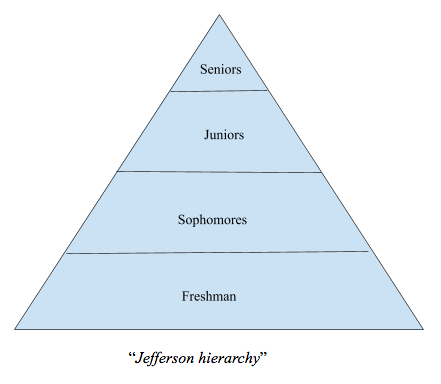Student Privileges: Are they Good or Bad?

Typically, high school hierarchies, like that of Jefferson, put seniors at the top and descend by grade level.
October 15, 2018
Throughout the world in nature, there has been a specific hierarchical social pattern. As Confucius, one of the world’s greatest philosophers, taught thousands of years before, there is a distinct relationship between students and teachers and children and parents. Likewise, I was raised in a household where I was always told to respect my elders, which I did without question. This tradition didn’t change after I went to high school either: no matter the situation, I still listened to upperclassman. Ever since the appointment of Dr. Ann Bonitatibus last year, Jefferson has undergone some major changes, becoming a school without upperclassmen privileges. While Bonitatibus classifies the privileges as either bullying or unnecessary I believe that removing them may bring more harm than good.
Like every other Jefferson student, when I came to Jefferson last year, I was met with a new class hierarchy which I readily complied to, not necessarily because I liked the rules but because that’s how life has always worked. Freshman were supposed to sit at the front of the bus and ate in their own commons. However, ever since the administration implemented their new policies, any sense of upperclassmen respect has disappeared along with bus hierarchies and senior privileges.
After asking around I learned that before Bonitatibus, seniors had their own lunch line, were able to leave five minutes early on both Wednesdays and Fridays and had a “slounge” which was a full room stocked with video games, ping pong and foosball, all of which vanished this year. In my opinion, seniors deserve these privileges after enduring Jefferson for 3 years and dealing with college applications along with everything else on their plate. The reasons behind the removal of privileges also do not make sense to me. How would giving seniors their own lunchline lead to bullying? Where is the data supporting this claim?
With the disappearance of all these customs, the sense of upperclassman respect is fading. The values that my parents have been teaching me my entire life have been thrown out to make way for new rules. And while the administration may think that upperclassman respect and privileges are forms of bullying, I believe the complete opposite. Teaching children to respect their elders provides them with an outlook to treat people respectfully and professionally when growing up. Additionally, all of the nervous and tired seniors at Jefferson need an outlet to relieve their stress, something that benefits like the “slounge” provided. By providing seniors with perks like the “slounge”, Jefferson morale will improve as some of the overall stress disappears.
While some may say that the removal of senior privileges isn’t directly correlated to the freshman uprising, I think it is. The eradication of privileges seniors had over the other classes led to a domino effect that impacted every class, especially freshman. It may seem like I’m exaggerating, but think of it like this: If one animal were to be removed from a food chain, the entire environment would be affected. Similarly, once senior power was removed, all of Jefferson was thrown into disarray. Now Jefferson freshman are losing respect for the upperclassman, as seen in their refusals to sit at the front of buses and invasion of Nobel commons during lunch.
All in all, I believe that if senior privileges were to be reinstated, that would help fix the lack of respect from underclassmen at Jefferson and improve morale. It may be easy to forget how difficult attending Jefferson can be, which is why student privileges should be used as an accommodation for this stress. I love Jefferson and in my opinion, the first step in making this school better would be to reinstate senior privileges.





